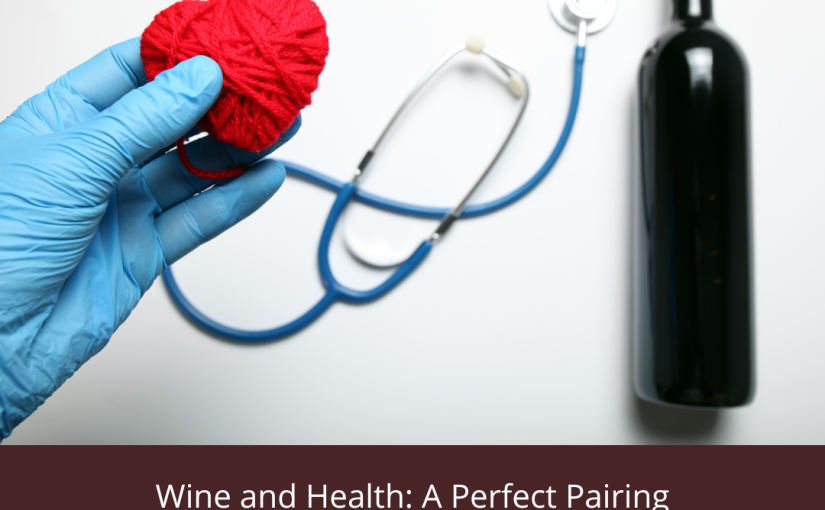Wine has been enjoyed by people for thousands of years, not only for its rich and complex flavors but also for its potential health benefits. Research has shown that moderate wine consumption may be associated with several positive health outcomes, particularly for heart health. However, it is important to note that excessive alcohol consumption can have harmful effects on health. In this article, we’ll explore the potential health benefits and risks of wine consumption.
Heart Health Benefits: Wine and Health
Moderate wine consumption has been linked to several benefits for heart health. Studies have found that regular, moderate wine consumption can help lower the risk of developing heart disease, the leading cause of death worldwide. This may be due to the presence of polyphenols in wine, which are compounds found in grapes that have antioxidant properties. Polyphenols have been shown to help reduce inflammation and oxidative stress, which are both linked to the development of heart disease.
In addition, wine consumption has been linked to an increase in high-density lipoprotein (HDL) cholesterol, commonly referred to as “good” cholesterol. HDL cholesterol helps remove low-density lipoprotein (LDL) cholesterol, known as “bad” cholesterol, from the bloodstream. High levels of LDL cholesterol can contribute to the buildup of plaque in the arteries, which can increase the risk of heart disease. By increasing HDL cholesterol levels, wine consumption may help reduce the risk of heart disease.
Other Health Benefits
In addition to potential benefits for heart health, wine consumption has been linked to other health benefits as well. For example, research has shown that moderate wine consumption may help reduce the risk of certain types of cancer, including colon, ovarian, and prostate cancer. This may be due to the antioxidant properties of polyphenols, which can help protect cells from damage that can lead to cancer.
Wine consumption has also been linked to a lower risk of developing type 2 diabetes, a condition in which the body is unable to properly regulate blood sugar levels. Studies have found that moderate wine consumption may help improve insulin sensitivity, which can reduce the risk of developing type 2 diabetes.
Risks of Excessive Wine Consumption
While moderate wine consumption has been linked to several health benefits, excessive alcohol consumption can have harmful effects on health. Drinking too much wine can increase the risk of developing several health conditions, including liver disease, high blood pressure, and certain types of cancer. In addition, excessive alcohol consumption can lead to alcohol dependence and other mental health issues.
It is important to note that the recommended amount of wine consumption varies depending on factors such as age, gender, and overall health. According to the Centers for Disease Control and Prevention (CDC), moderate alcohol consumption is defined as up to one drink per day for women and up to two drinks per day for men. However, it is important to note that some individuals may be more sensitive to the effects of alcohol and may need to consume less in order to avoid negative health outcomes.
Tips for Moderating Wine Consumption: Wine and Health
If you enjoy drinking wine and want to reap the potential health benefits without increasing your risk of negative health outcomes, there are several tips you can follow to help moderate your consumption. Here are a few ideas:
- Stick to the recommended guidelines: As mentioned earlier, moderate alcohol consumption is defined as up to one drink per day for women and up to two drinks per day for men. Stick to these guidelines in order to avoid excessive consumption.
- Choose lower-alcohol wines: Some wines, such as fortified wines like Port or Sherry, have higher alcohol content than others. Choose lower-alcohol wines, such as Riesling or Pinot Noir, to help moderate your consumption.
- Sip slowly: Instead of drinking wine quickly, sip it slowly and savor the flavors and aromas. This can help you enjoy the wine without consuming too much too quickly
- Alternate with water: Drinking water in between glasses of wine can help you stay hydrated and avoid drinking too much wine too quickly.
- Eat before drinking: Consuming food before drinking wine can help slow down the absorption of alcohol in the bloodstream, which can reduce the risk of negative health outcomes.
- Know your limits: It is important to know your own limits when it comes to alcohol consumption. If you find that you are unable to stick to moderate consumption guidelines, it may be best to avoid drinking wine altogether.
In conclusion, moderate wine consumption may be associated with several positive health outcomes, particularly for heart health. Polyphenols in wine have antioxidant properties that may help reduce inflammation and oxidative stress, which are both linked to the development of heart disease. In addition, wine consumption has been linked to a lower risk of certain types of cancer and type 2 diabetes.
However, it is important to note that excessive alcohol consumption can have harmful effects on health, including an increased risk of liver disease, high blood pressure, and certain types of cancer. To reap the potential health benefits of wine while avoiding negative health outcomes, it is important to stick to recommended consumption guidelines and know your own limits. Drinking wine in moderation and following these tips can help you enjoy the flavors and potential health benefits of wine without increasing your risk of negative health outcomes.
Next time you bring your heart healthy wine to a restaurant to share with the table, be sure to add the corkage fee into the app to build our wine loving community!
